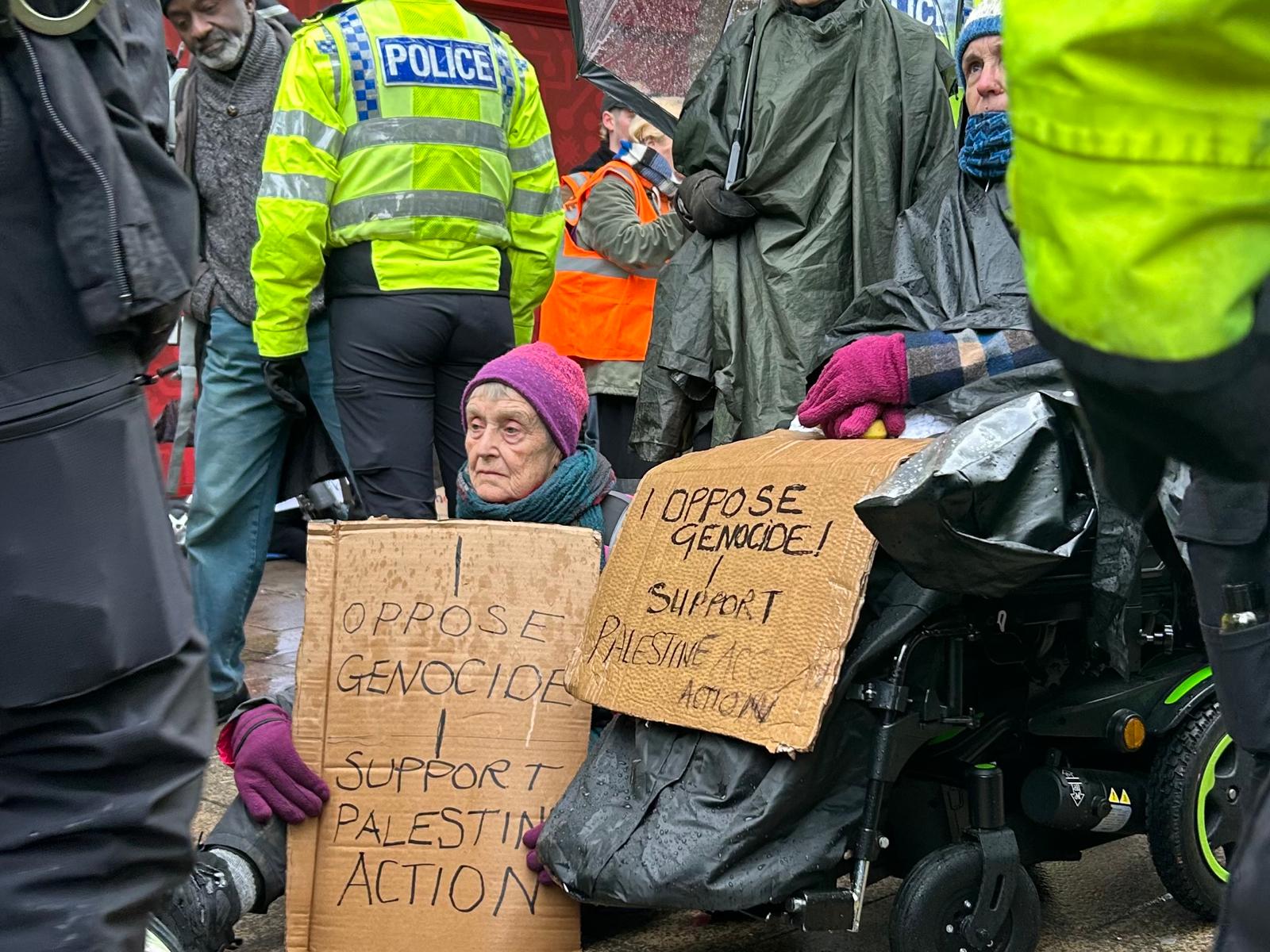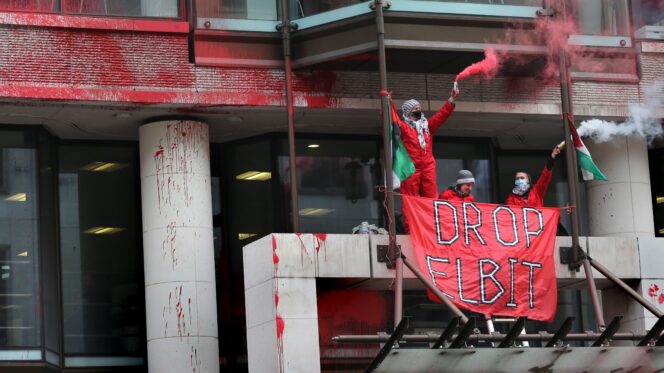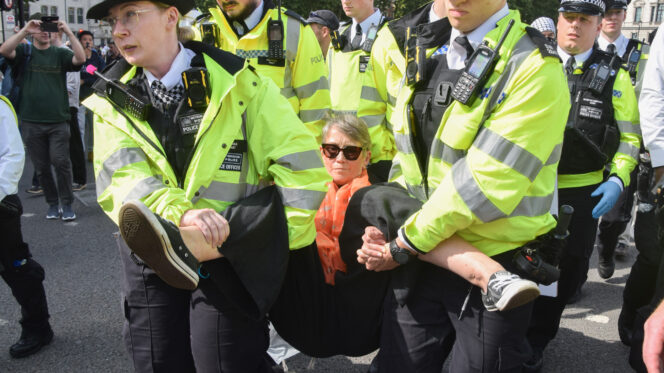The Co-Founder of Palestine Action Is Taking the Government to Court
Here’s what you need to know.
by Harriet Williamson
20 November 2025

The co-founder of direct action group Palestine Action is challenging its controversial proscription under UK terror law in London’s high court.
Huda Ammori’s legal challenge to the government’s ban on Palestine Action comes in the form of a judicial review and will take place from Tuesday 25 to Thursday 27 November. This is the first time in British history that a proscribed group has been able to legally challenge proscription via judicial review.
If Ammori wins, the high court will rule that then-home secretary Yvette Cooper’s decision to proscribe Palestine Action was unlawful, effectively lifting the ban. This means that thousands of arrests and hundreds of charges made under the Terrorism Act since the ban came into force will be quashed.
Being a member of or showing support for Palestine Action is currently punishable by up to 14 years in prison.
Ammori told Novara Media that this is not just about a legal case, it’s a “political case”.
“It’s the people going out on the streets, standing up for what they believe in, standing up against this government and drawing a line in the sand to say, you cannot get away with this,” she added. “Whether we win at this point or whether we win in the future, we will win, and we will fight this the whole way until we are successful.”
A civil disobedience campaign described by organisers as “the most widespread” in modern British history is currently underway, spanning the two weeks around the review. Coordinated by campaign group Defend Our Juries (DOJ), it involves 24 protests across 20 towns and cities. Dozens of people were arrested in ten locations on Tuesday, followed by more than 40 in London on Thursday. Hundreds are expected to protest in Belfast, Derry and London again on Saturday.
More than 2,100 people have been arrested under the Terrorism Act for allegedly showing support for Palestine Action since it was banned in July, most for holding signs reading: “I oppose genocide, I support Palestine Action.” The police response has been inconsistent, with officers telling Novara Media that they feel “ashamed and sick” when enforcing the ban.
More people have been arrested for offences under Section 13 of the Terrorism Act since the proscription of Palestine Action than during the entire ‘war on terror’. Many of those arrested have been elderly, including 83-year-old Anglican priest Sue Parfitt.
What is a judicial review?
A judicial review is a type of court proceeding where a judge looks at whether a decision or action taken by a public body – in this case, the government – was taken lawfully. It’s about whether a decision was made in the right way, rather than whether the decision itself is right or wrong.
Ammori’s judicial review will challenge whether the government went about proscribing Palestine Action using the correct procedures.
The International Centre of Justice for Palestinians’ head of legal Mutahir Ahmed told Novara Media: “In the case of Palestine Action, the process of judicial review involves the high court examining the legality of [the] Home Office’s decision to proscribe Palestine Action, and it is not the court’s function to examine the merits of the decision itself.
“Through judicial review, the primary remedy sought is a ‘quashing order’, which means, this order nullifies [the] Home Office’s decision to proscribe. If the judicial review proceedings are successful, the Home Office decision will be invalid.”
How could the government lose?
Ahmed says that the court may find the Home Office decision to proscribe Palestine Action unlawful because proscription is “beyond the intended scope and purpose of parliament’s use of the proscription system”.
The high court may also find that as a result of the ban on Palestine Action, the Home Office has “acted disproportionately in interfering with the rights to freedom of expression and assembly”. These rights are protected by the Human Rights Act 1998 – which incorporates into UK law the rights contained in the European Convention on Human Rights (ECHR).
Ahmed adds that the court may conclude that the home secretary “breached the public sector equality duty under the Equality Act 2010 by failing to consider the impact on relevant groups, including Palestinians in the UK”.
What happens if Palestine Action wins?
If Palestine Action’s co-founder wins over the government, the proscription order that banned the group as a terrorist organisation could be declared unlawful from its inception. This means that all subsequent arrests and criminal charges under the ban will be deemed unlawful as well.
Those arrests and charges would be quashed to “prevent chaos in various criminal courts handling these cases across England and Wales”, Ahmed explains.
“A government loss would be seen as a victory for civil liberties and the right to protest, potentially having a ‘chilling effect’ on the future use of broad counter-terrorism powers against direct action groups.”
Although those charged with supporting a proscribed organisation for holding signs would likely have their charges dismissed, Ahmed says it is “highly unlikely that there would be any compensation claim against the police, as the police actions and arrests were in accordance with the law and guidance at the time the proscription was in place”.
Amed adds: “However, if it can be proved that the police acted unlawfully or outside their powers, then there could be compensation. We have to remember that the police cannot be expected not to take action if there is a possibility that the government’s decision is overturned by the court.”
What has happened in the legal process so far?
A judicial review to challenge the proscription of Palestine Action was granted to Ammori by Mr Justice Chamberlain in July.
Chamberlain made the decision on two grounds; that the proscription of Palestine Action interferes disproportionately with the rights to free speech and assembly – Articles 10 and 11 of the ECHR – and that the home secretary failed to consult with Palestine Action before making her decision to proscribe.
Regarding free speech and assembly, Ammori told Novara Media: “We could not have more evidence about how this is true – we’ve seen it across the country in terms of the more than 2,000 arrests. And it’s not only those who have been directly affected in the sense that their speech has been punished as a result of the proscription, but it’s the tens of hundreds of thousands and millions of people in Britain who have been silenced.
“This has caused a huge chilling effect, where many more people will be afraid to speak out about what they truly believe.”
On the failure to consult with Palestine Action, Ammori said: “There have been so many errors, I would say deliberate errors, in their reasoning for proscribing Palestine Action which they could have been corrected on if they had bothered to consult Palestine Action or any human rights group. Instead, they worked with and consulted with pro-Israel lobby groups and the weapons industry.”
The government tried and failed to block the judicial review.
The government has already tried to block Ammori’s judicial review from going ahead. The Home Office filed an appeal on 25 September, asking the Court of Appeal to overturn Chamberlain’s decision because it argued that there are other avenues to challenge proscription that should be used before a judicial review, which it described as the “remedy of last resort”.
Any group banned under terror laws can ask to be ‘deproscribed’ through an internal Home Office review. This can take months to complete. Then if ministers decide the ban should remain, the next avenue is to go to the Proscribed Organisations Appeal Commission (POAC) – a semi-secret court, where the group could spend over a year fighting to show it is not involved in terrorism.
However, the government’s appeal was dismissed in a major victory for Ammori on 17 October.
Not only did three judges – led by the lady chief justice Sue Carr – uphold the decision to grant Ammori a judicial review of Palestine Action’s proscription, but they granted two further grounds on which to challenge the legality of the ban, in addition to the two already granted by Chamberlain.
Carr said: “An application to deproscribe, with a right of appeal to POAC, was not intended to be a means of challenging the initial decision.” She added that a judicial review would be a “quicker means of challenging the order proscribing Palestine Action, than applying to deproscribe”.
The two additional grounds that can now be argued by Ammori’s legal team at judicial review are whether Cooper failed to have regard to domestic public law principles and whether she applied her own policy.
Ammori’s lawyers have argued that Cooper failed to “adequately assess the proportionality of the proscription”.
Human rights organisations Liberty and Amnesty International UK have both intervened in the case. They have criticised the UK’s definition of terrorism as being “extremely broad”, and said it “extends beyond international definitions”.
Both Liberty and Amnesty said proscribing a group whose actions fall under the “outer reaches” of the UK definition is not proportionate.
Why was Palestine Action banned?
The proscription of Palestine Action came into force on 5 July, following the group’s targeting of factories owned by Israel’s largest weapons manufacturer, Elbit Systems, to disrupt the flow of arms used in Israel’s genocidal war on Gaza.
It’s the first time a non-violent direct action group has been proscribed under the Terrorism Act, putting Palestine Action in the same category as Isis and Al Qaeda.
Cooper told parliament in June that she intended to proscribe Palestine Action following its “aggressive and intimidatory attacks against businesses, institutions and the public, which has crossed the thresholds established in the Terrorism Act 2000”.
Palestine Action was ‘bundled’ with two white supremacist groups – the Maniacs Murder Cult (MMC) and the Russian Imperial Movement (RIM) – for the proscription vote, in a move that numerous MPs voiced opposition to.
The June action where Palestine Action activists allegedly broke into RAF Brize Norton and sprayed Voyager planes – which activists said were used in Israel’s war on Gaza – with red paint acted as “the trigger but not the cause of the proscription order” according to a Declassified investigation which found that it had been approved months before.
Cooper said in August that people objecting to the ban on Palestine Action “don’t know the full nature of this organisation” due to court restrictions on reporting “while serious prosecutions are underway”. She added: “It’s really important that no-one is in any doubt that this is not a non-violent organisation.”
Ammori has called the claim that Palestine Action is a violent organisation false and defamatory.
Another claim – that Iran was making donations to Palestine Action “via proxies” and reported in both the Times and the Daily Mail – was allegedly planted by a PR firm which works with Elbit Systems, according to a November Private Eye report.
During the subsequent legal proceedings, documents have been released showing that on Cooper’s own assessment, only three of the Palestine Action’s 385 actions would meet the statutory definition of terrorism. What’s more, the Home Office confirmed that the Joint Terrorism Analysis Centre within MI5 found the majority of Palestine Action activity was not terrorism “but does often involve criminality”.
Ammori said: “There was no need for proscription, but they wanted to appease the Israeli weapons industry. And that is why we are now seeing the unprecedented use of the serious property damage clause … to call direct action terrorism.
“We will be strongly attacking the government’s case of proscription and the many, many flaws that we have found within their decision making. If we are unsuccessful for any reason, then we will be appealing and taking this the full way.”
The Home Office has been approached for comment.
Harriet Williamson is a commissioning editor and reporter for Novara Media.


